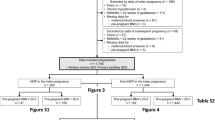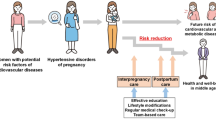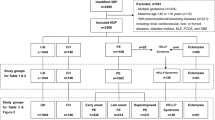Abstract
Background
Hypertensive disorders of pregnancy (HDP), including pregnancy-induced hypertension (PIH), Preeclampsia (PE), Hemolysis Elevated Liver enzymes and Low Platelets (HELLP) and chronic hypertension, are leading causes of maternal and perinatal morbidity and mortality. Although the pathophysiology of HDP is complex, preconceptional weight reduction in obese women might reduce these complications. We conducted a systematic review and meta-analysis to investigate the effectiveness of preconceptional weight loss by lifestyle intervention or bariatric surgery in overweight and obese women and the reduction of the risk of HDP.
Methods and results
Databases are searched until September 2019 resulting in 2547 articles: 110 full-text analysis and 29 detailed analysis. Reduced risks were shown for HDP in seven articles (n = 4381) of weight loss after lifestyle intervention or bariatric surgery (OR range 0.10–0.64), for PIH in four articles (n = 46,976) (OR range 0.14–0.79), and for PE in seven articles (n = 169,734) (OR range 0.14–0.84). The stratified analysis of weight loss after lifestyle intervention and bariatric surgery shows comparable results. The meta-analysis of 20 studies of the effectiveness of lifestyle intervention and bariatric surgery revealed reduced risks of HDP (OR 0.45 (95% CI 0.32–0.63)), PIH (OR 0.61 (95%CI 0.44–0.85)) and PE (OR 0.67 (95%CI 0.51–0.88)).
Conclusions
Preconceptional weight loss after lifestyle intervention or bariatric surgery is effective in reducing risks of HDP, PIH and PE, and emphasizes the need to optimize weight in overweight and obese women with a child wish. More research is recommended to investigate short-term and long-term beneficial and harmful side-effects of these interventions on maternal and offspring health.
This is a preview of subscription content, access via your institution
Access options
Subscribe to this journal
Receive 12 print issues and online access
$259.00 per year
only $21.58 per issue
Buy this article
- Purchase on Springer Link
- Instant access to full article PDF
Prices may be subject to local taxes which are calculated during checkout




Similar content being viewed by others
References
Steegers EA, von Dadelszen P, Duvekot JJ, Pijnenborg R. Pre-eclampsia. Lancet. 2010;376:631–44.
Khan KS, Wojdyla D, Say L, Gulmezoglu AM, Van Look PF. WHO analysis of causes of maternal death: a systematic review. Lancet. 2006;367:1066–74.
Zhang J, Meikle S, Trumble A. Severe maternal morbidity associated with hypertensive disorders in pregnancy in the United States. Hypertens Pregnancy. 2003;22:203–12.
Baeten JM, Bukusi EA, Lambe M. Pregnancy complications and outcomes among overweight and obese nulliparous women. Am J Public Health. 2001;91:436–40.
O’Brien TE, Ray JG, Chan WS. Maternal body mass index and the risk of preeclampsia: a systematic overview. Epidemiology. 2003;14:368–74.
Sebire NJ, Jolly M, Harris JP, Wadsworth J, Joffe M, Beard RW, et al. Maternal obesity and pregnancy outcome: a study of 287,213 pregnancies in London. Int J Obes Relat Metab Disord. 2001;25:1175–82.
Reynolds RM, Allan KM, Raja EA, Bhattacharya S, McNeill G, Hannaford PC, et al. Maternal obesity during pregnancy and premature mortality from cardiovascular event in adult offspring: follow-up of 1 323 275 person years. BMJ. 2013;347:f4539.
Brown MA, Magee LA, Kenny LC, Karumanchi SA, McCarthy FP, Saito S, et al. Hypertensive disorders of pregnancy: ISSHP classification, diagnosis, and management recommendations for international practice. Hypertension. 2018;72:24–43.
Apovian CM. Obesity: definition, comorbidities, causes, and burden. Am J Manag Care. 2016;22:s176–85. 7 Suppl
Flegal KM, Carroll MD, Ogden CL, Curtin LR. Prevalence and trends in obesity among US adults, 1999–2008. JAMA. 2010;303:235–41.
Ma RCW, Schmidt MI, Tam WH, McIntyre HD, Catalano PM. Clinical management of pregnancy in the obese mother: before conception, during pregnancy, and post partum. Lancet Diabetes Endocrinol. 2016;4:1037–49.
Cedergren MI. Maternal morbid obesity and the risk of adverse pregnancy outcome. Obstet Gynecol. 2004;103:219–24.
Godfrey KM, Reynolds RM, Prescott SL, Nyirenda M, Jaddoe VW, Eriksson JG, et al. Influence of maternal obesity on the long-term health of offspring. Lancet Diabetes Endocrinol. 2017;5:53–64.
Steegers-Theunissen RPM. Periconception mHealth platform for prevention of placental-related outcomes and non-communicable diseases. Placenta. 2017;60:115–8.
Dodd JM, Turnbull D, McPhee AJ, Deussen AR, Grivell RM, Yelland LN, et al. Antenatal lifestyle advice for women who are overweight or obese: LIMIT randomised trial. BMJ. 2014;348:g1285.
Muktabhant B, Lawrie TA, Lumbiganon P, Laopaiboon M. Diet or exercise, or both, for preventing excessive weight gain in pregnancy. Cochrane Database Syst Rev. 2015;6:CD007145.
Poston L, Bell R, Croker H, Flynn AC, Godfrey KM, Goff L, et al. Effect of a behavioural intervention in obese pregnant women (the UPBEAT study): a multicentre, randomised controlled trial. Lancet Diabetes Endocrinol. 2015;3:767–77.
Campbell OM, Graham WJ. Lancet Maternal Survival Series steering g. Strategies for reducing maternal mortality: getting on with what works. Lancet. 2006;368:1284–99.
Buchwald H, Estok R, Fahrbach K, Banel D, Jensen MD, Pories WJ, et al. Weight and type 2 diabetes after bariatric surgery: systematic review and meta-analysis. Am J Med. 2009;122:248–56 e5.
van Oers AM, Mutsaerts MAQ, Burggraaff JM, Kuchenbecker WKH, Perquin DAM, Koks CAM, et al. Association between periconceptional weight loss and maternal and neonatal outcomes in obese infertile women. PLoS One. 2018;13:e0192670.
Villamor E, Cnattingius S. Interpregnancy weight change and risk of adverse pregnancy outcomes: a population-based study. Lancet. 2006;368:1164–70.
Yi XY, Li QF, Zhang J, Wang ZH. A meta-analysis of maternal and fetal outcomes of pregnancy after bariatric surgery. Int J Gynaecol Obstet. 2015;130:3–9.
Hamilton OMU. Quality assessment tool for quantitative studies. National Collaborating Centre for Methods and Tools. Ontario. 2008.
Adane AA, Mishra GD, Tooth LR. Adult pre-pregnancy weight change and risk of developing hypertensive disorders in pregnancy. Paediatr Perinat Epidemiol. 2017;31:167–75.
Bogaerts A, Van den Bergh BR, Ameye L, Witters I, Martens E, Timmerman D, et al. Interpregnancy weight change and risk for adverse perinatal outcome. Obstet Gynecol. 2013;122:999–1009.
Diouf I, Charles MA, Thiebaugeorges O, Forhan A, Kaminski M, Heude B, et al. Maternal weight change before pregnancy in relation to birthweight and risks of adverse pregnancy outcomes. Eur J Epidemiol. 2011;26:789–96.
Dude AM, Shahawy S, Grobman WA. Delivery-to-delivery weight gain and risk of hypertensive disorders in a subsequent pregnancy. Obstet Gynecol. 2018;132:868–74.
Frederick IO, Rudra CB, Miller RS, Foster JC, Williams MA. Adult weight change, weight cycling, and prepregnancy obesity in relation to risk of preeclampsia. Epidemiology. 2006;17:428–34.
Lynes C, McLain AC, Yeung EH, Albert P, Liu J, Boghossian NS. Interpregnancy weight change and adverse maternal outcomes: a retrospective cohort study. Ann Epidemiol. 2017;27:632–7 e5.
McBain RD, Dekker GA, Clifton VL, Mol BW, Grzeskowiak LE. Impact of inter-pregnancy BMI change on perinatal outcomes: a retrospective cohort study. Eur J Obstet Gynecol Reprod Biol. 2016;205:98–104.
Mostello D, Jen Chang J, Allen J, Luehr L, Shyken J, Leet T. Recurrent preeclampsia: the effect of weight change between pregnancies. Obstet Gynecol. 2010;116:667–72.
Pole JD, Dodds LA. Maternal outcomes associated with weight change between pregnancies. Can J Public Health. 1999;90:233–6.
Wallace JM, Bhattacharya S, Campbell DM, Horgan GW. Inter-pregnancy weight change impacts placental weight and is associated with the risk of adverse pregnancy outcomes in the second pregnancy. BMC Pregnancy Childbirth. 2014;14:40.
Wallace JM, Bhattacharya S, Campbell DM, Horgan GW. Inter-pregnancy weight change and the risk of recurrent pregnancy complications. PLoS One. 2016;11:e0154812.
Adams TD, Hammoud AO, Davidson LE, Laferrere B, Fraser A, Stanford JB, et al. Maternal and neonatal outcomes for pregnancies before and after gastric bypass surgery. Int J Obes. 2015;39:686–94.
Amsalem D, Aricha-Tamir B, Levi I, Shai D, Sheiner E. Obstetric outcomes after restrictive bariatric surgery: what happens after 2 consecutive pregnancies? Surg Obes Relat Dis. 2014;10:445–9.
Aricha-Tamir B, Weintraub AY, Levi I, Sheiner E. Downsizing pregnancy complications: a study of paired pregnancy outcomes before and after bariatric surgery. Surg Obes Relat Dis. 2012;8:434–9.
Balestrin B, Urbanetz AA, Barbieri MM, Paes A, Fujie J. Pregnancy after bariatric surgery: a comparative study of post-bariatric pregnant women versus non-bariatric obese pregnant women. Obes Surg. 2019;29:3142–8.
Basbug A, Ellibes Kaya A, Dogan S, Pehlivan M, Goynumer G. Does pregnancy interval after laparoscopic sleeve gastrectomy affect maternal and perinatal outcomes? J Matern Fetal Neonatal Med. 2019;32:3764–70.
Blume CA, Machado BM, da Rosa RR, Rigoni MDS, Casagrande DS, Mottin CC, et al. Association of maternal roux-en-Y gastric bypass with obstetric outcomes and fluid intelligence in offspring. Obes Surg. 2018;28:3611–20.
de Alencar Costa LA, Araujo Junior E, de Lucena Feitosa FE, Dos Santos AC, Moura Junior LG, Costa Carvalho FH. Maternal and perinatal outcomes after bariatric surgery: a case control study. J Perinat Med 2016;44:383–8.
De Carolis S, Botta A, Del Sordo G, Guerrisi R, Salvi S, De Carolis MP, et al. Influence of biliopancreatic diversion on pregnancy outcomes in comparison to other bariatric surgery procedures. Obes Surg. 2018;28:3284–92.
Deitel M, Stone E, Kassam HA, Wilk EJ, Sutherland DJ. Gynecologic-obstetric changes after loss of massive excess weight following bariatric surgery. J Am Coll Nutr. 1988;7:147–53.
Dixon JB, Dixon ME, O’Brien PE. Birth outcomes in obese women after laparoscopic adjustable gastric banding. Obstet Gynecol.2005;106:965–72.
Ducarme G, Revaux A, Rodrigues A, Aissaoui F, Pharisien I, Uzan M. Obstetric outcome following laparoscopic adjustable gastric banding. Int J Gynaecol Obstet. 2007;98:244–7.
Lapolla A, Marangon M, Dalfra MG, Segato G, De Luca M, Fedele D, et al. Pregnancy outcome in morbidly obese women before and after laparoscopic gastric banding. Obes Surg. 2010;20:1251–7.
Lesko J, Peaceman A. Pregnancy outcomes in women after bariatric surgery compared with obese and morbidly obese controls. Obstet Gynecol. 2012;119:547–54.
Rottenstreich A, Elchalal U, Kleinstern G, Beglaibter N, Khalaileh A, Elazary R. Maternal and perinatal outcomes after laparoscopic sleeve gastrectomy. Obstet Gynecol. 2018;131:451–6.
Santulli P, Mandelbrot L, Facchiano E, Dussaux C, Ceccaldi PF, Ledoux S, et al. Obstetrical and neonatal outcomes of pregnancies following gastric bypass surgery: a retrospective cohort study in a French referral centre. Obes Surg. 2010;20:1501–8.
Skull AJ, Slater GH, Duncombe JE, Fielding GA. Laparoscopic adjustable banding in pregnancy: safety, patient tolerance and effect on obesity-related pregnancy outcomes. Obes Surg. 2004;14:230–5.
Johansson K, Cnattingius S, Naslund I, Roos N, Trolle Lagerros Y, Granath F, et al. Outcomes of pregnancy after bariatric surgery. N. Engl J Med. 2015;372:814–24.
Roos N, Neovius M, Cnattingius S, Trolle Lagerros Y, Saaf M, Granath F, et al. Perinatal outcomes after bariatric surgery: nationwide population based matched cohort study. BMJ. 2013;347:f6460.
O’Gorman N, Wright D, Syngelaki A, Akolekar R, Wright A, Poon LC, et al. Competing risks model in screening for preeclampsia by maternal factors and biomarkers at 11-13 weeks gestation. Am J Obstet Gynecol. 2016;214:103.e1–e12.
Spradley FT, Palei AC, Granger JP. Increased risk for the development of preeclampsia in obese pregnancies: weighing in on the mechanisms. Am J Physiol Regul Integr Comp Physiol. 2015;309:R1326–43.
Engin AB. What is lipotoxicity? Adv Exp Med Biol. 2017;960:197–220.
Howell KR, Powell TL. Effects of maternal obesity on placental function and fetal development. Reproduction. 2017;153:R97–R108.
Heymsfield SB, Wadden TA. Mechanisms, pathophysiology, and management of obesity. N Engl J Med. 2017;376:254–66.
Kahn SE, Hull RL, Utzschneider KM. Mechanisms linking obesity to insulin resistance and type 2 diabetes. Nature. 2006;444:840–6.
Lopez-Jaramillo P, Barajas J, Rueda-Quijano SM, Lopez-Lopez C, Felix C. Obesity and preeclampsia: common pathophysiological mechanisms. Front Physiol. 2018;9:1838.
Wolf M, Kettyle E, Sandler L, Ecker JL, Roberts J, Thadhani R. Obesity and preeclampsia: the potential role of inflammation. Obstet Gynecol.2001;98:757–62.
Yogev Y, Catalano PM. Pregnancy and obesity. Obstet Gynecol Clin North Am.2009;36:285–300.viii.
Forsythe LK, Wallace JM, Livingstone MB. Obesity and inflammation: the effects of weight loss. Nutr Res Rev. 2008;21:117–33.
Magkos F, Fraterrigo G, Yoshino J, Luecking C, Kirbach K, Kelly SC, et al. Effects of moderate and subsequent progressive weight loss on metabolic function and adipose tissue biology in humans with obesity. Cell Metab. 2016;23:591–601.
Schummers L, Hutcheon JA, Bodnar LM, Lieberman E, Himes KP. Risk of adverse pregnancy outcomes by prepregnancy body mass index: a population-based study to inform prepregnancy weight loss counseling. Obstet Gynecol. 2015;125:133–43.
Bodnar LM, Catov JM, Klebanoff MA, Ness RB, Roberts JM. Prepregnancy body mass index and the occurrence of severe hypertensive disorders of pregnancy. Epidemiology. 2007;18:234–9.
van Dijk MR, Koster MPH, Oostingh EC, Willemsen SP, Steegers EAP, Steegers-Theunissen RPM. A mobile app lifestyle intervention to improve healthy nutrition in women before and during early pregnancy: single-center randomized controlled trial. J Med Internet Res. 2020;22:e15773.
Parrott J, Frank L, Rabena R, Craggs-Dino L, Isom KA, Greiman L. American society for metabolic and bariatric surgery integrated health nutritional guidelines for the surgical weight loss patient 2016 update: micronutrients. Surg Obes Relat Dis. 2017;13:727–41.
Xanthakos SA. Nutritional deficiencies in obesity and after bariatric surgery. Pediatr Clin North Am. 2009;56:1105–21.
Dolin CD, Chervenak J, Pivo S, Ude Welcome A, Kominiarek MA. Association between time interval from bariatric surgery to pregnancy and maternal weight outcomes. J Matern Fetal Neonatal Med. 2019, 1–7, (ahead-of-print).
Parent B, Martopullo I, Weiss NS, Khandelwal S, Fay EE, Rowhani-Rahbar A. Bariatric surgery in women of childbearing age, timing between an operation and birth, and associated perinatal complications. JAMA Surg. 2017;152:128–35.
Acknowledgements
We want to thank Mitch Vleghert (MV) for his help with the literature search.
Funding
This research was funded by the department of Obstetrics and Gynecology of the Erasmus Medical Center, Rotterdam.
Author information
Authors and Affiliations
Corresponding author
Ethics declarations
Conflict of interest
The authors declare no competing interests.
Additional information
Publisher’s note Springer Nature remains neutral with regard to jurisdictional claims in published maps and institutional affiliations.
Supplementary information
Rights and permissions
About this article
Cite this article
Schenkelaars, N., Rousian, M., Hoek, J. et al. Preconceptional maternal weight loss and hypertensive disorders in pregnancy: a systematic review and meta-analysis. Eur J Clin Nutr 75, 1684–1697 (2021). https://doi.org/10.1038/s41430-021-00902-9
Received:
Revised:
Accepted:
Published:
Issue Date:
DOI: https://doi.org/10.1038/s41430-021-00902-9
This article is cited by
-
Pregnancy Complications in Women with Weight Loss Surgery Compared to a Non-Surgical Population of Women with Obesity
Obesity Surgery (2022)
-
Obesity in pregnant women: maternal, fetal, and transgenerational consequences
European Journal of Clinical Nutrition (2021)



